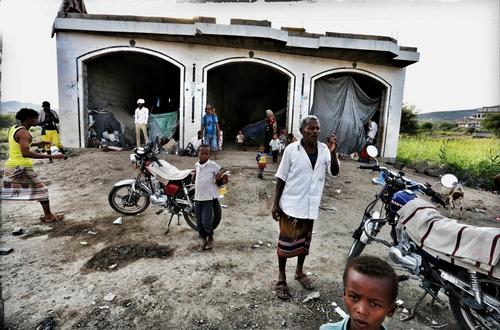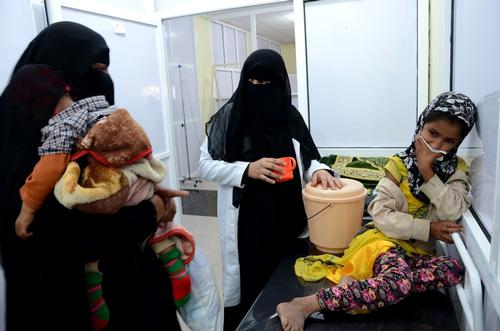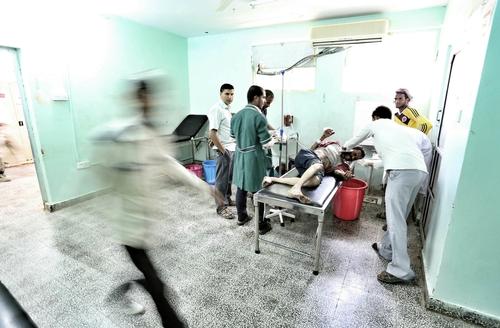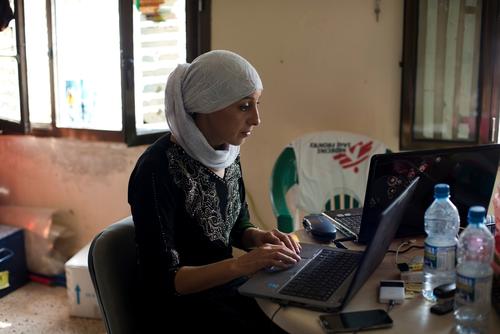- When war escalated in Yemen, Sana was abroad, having just qualified as a doctor.
- Hearing the news, she felt compelled to return to Taiz, scene of some of the conflict's fiercest fighting.
- Now she works in the malnutrition ward of MSF's mother and child hospital.
"I had just finished studying medicine in Cairo when the war at home in Yemen escalated. My family said that I should stay in Egypt to be safe, but I wanted to go home. I arrived back on 25 May 2015.
At first, I stayed with my family – my parents, my two brothers and my sister – at our house in the centre of Taiz.
One day, a bullet hit a metal frame just outside our window as my sister and I sat inside, discussing a book. We were saved by pure luck.
In July we had to move. By then, our road was full of soldiers and there was heavy fighting in the neighbourhood. There were tanks in the streets and the noise of heavy artillery and machine guns. We were facing death.
Next to our house was a tall shopping centre that was being used by snipers. One day I saw a boy shot. He was walking down the street outside our house. He wasn't a soldier – he was just an 18-year-old boy, unarmed.
The next day we left. We had no time to pack our things. All we took were some clothes and our most important papers. We went to stay with my uncle, who lives close to Taiz University. But we only stayed there for six weeks, as soon it became very unstable there too. There was fighting nearby and missiles hit the neighbourhood. We decided to get out of the city.
We moved to my grandparents' house – they live in a village some distance away. That's where we stayed for the next nine months.
It was an incredibly frustrating time. Word had spread that I was a doctor, and people came to me for help all the time. But there was very little I could do for them. I was able to buy some antibiotics, but I couldn't get hold of things like insulin or asthma medication.
I saw many people with skin diseases and rashes because they had fled their homes and were living in very poor conditions in old, run-down buildings. They couldn't afford to buy medicines for themselves. Sometimes my family paid for their transport to hospital in Sana'a, six or seven hours' drive away.
One day, I saw a woman with cancer. She couldn't get treatment, and I couldn't help her either. I gave her my gold ring so that she could afford to travel to a hospital in Sana'a.
It was safer to stay in the countryside, but there was so little I could do from home. For three months, I worked in a small doctor's practice nearby, but I wasn't comfortable with the way they always over-prescribed medications to make money for themselves. So I quit.
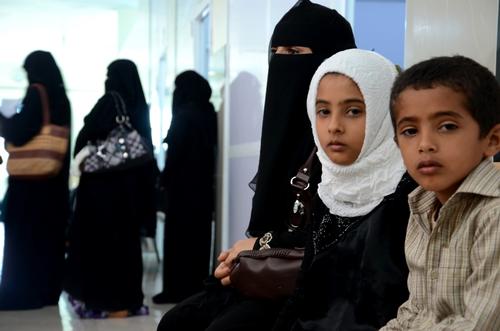
Last summer, I saw a job advertisement for a position in MSF's hospital in Taiz. I thought, 'That's what I’ve got to do!' To get to the job interview, I had to take a detour over the mountains because the main road was blocked. The trip took four hours instead of the normal one or two.
I started work with MSF in July, so we moved again. Now my parents and I live half an hour from the hospital. It would have been safer to stay in the countryside, but I need to work. I don’t care if it's a bit more dangerous here – I just have to work.
One day my father was on his way to pick me up from work in a borrowed minibus – his own car had been badly damaged by bullets before we moved away from the city. That afternoon, we heard an explosion: a bomb or a missile had struck not far away. I knew that my father was on his way here, and I was very worried about him. But luckily he turned up, only a little later than agreed. He told me that he'd been very worried about me too, even though he knew I was in the hospital.
I really like working here in the malnutrition intensive care ward. Most of our patients are young children, as they're most at risk of becoming severely malnourished. We had a pair of twins – a boy and a girl – whose family said they had nothing to eat at home. We admitted both twins to hospital, and at first they did quite well. Soon they were able to receive outpatient treatment, coming to the hospital once a week for a check-up and to collect a supply of therapeutic food. But soon, the girl's condition worsened. One day she arrived in such a weak state that she couldn't be saved. The boy is still alive, fortunately, though he is still on treatment.
In the future, I’d like to become a paediatrician. I want to help people at the start of their lives. I had all the paperwork ready to return to Cairo to specialise, but that didn't go as planned, and now the Ministry of Health has no money. I hope I'll be able to get a state scholarship and become a paediatrician later – if there's still such thing as a state."



